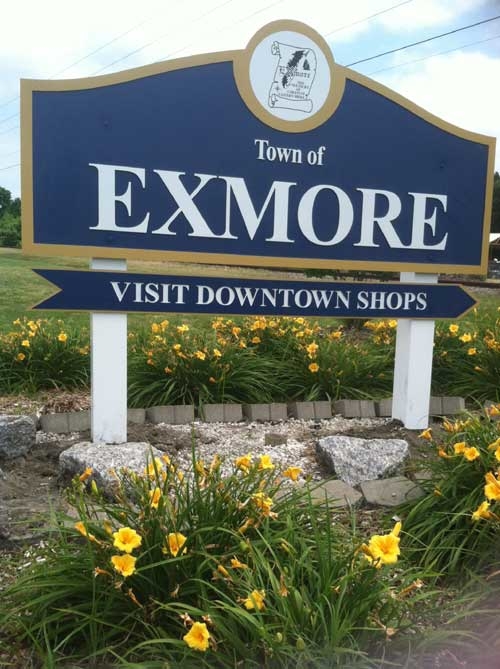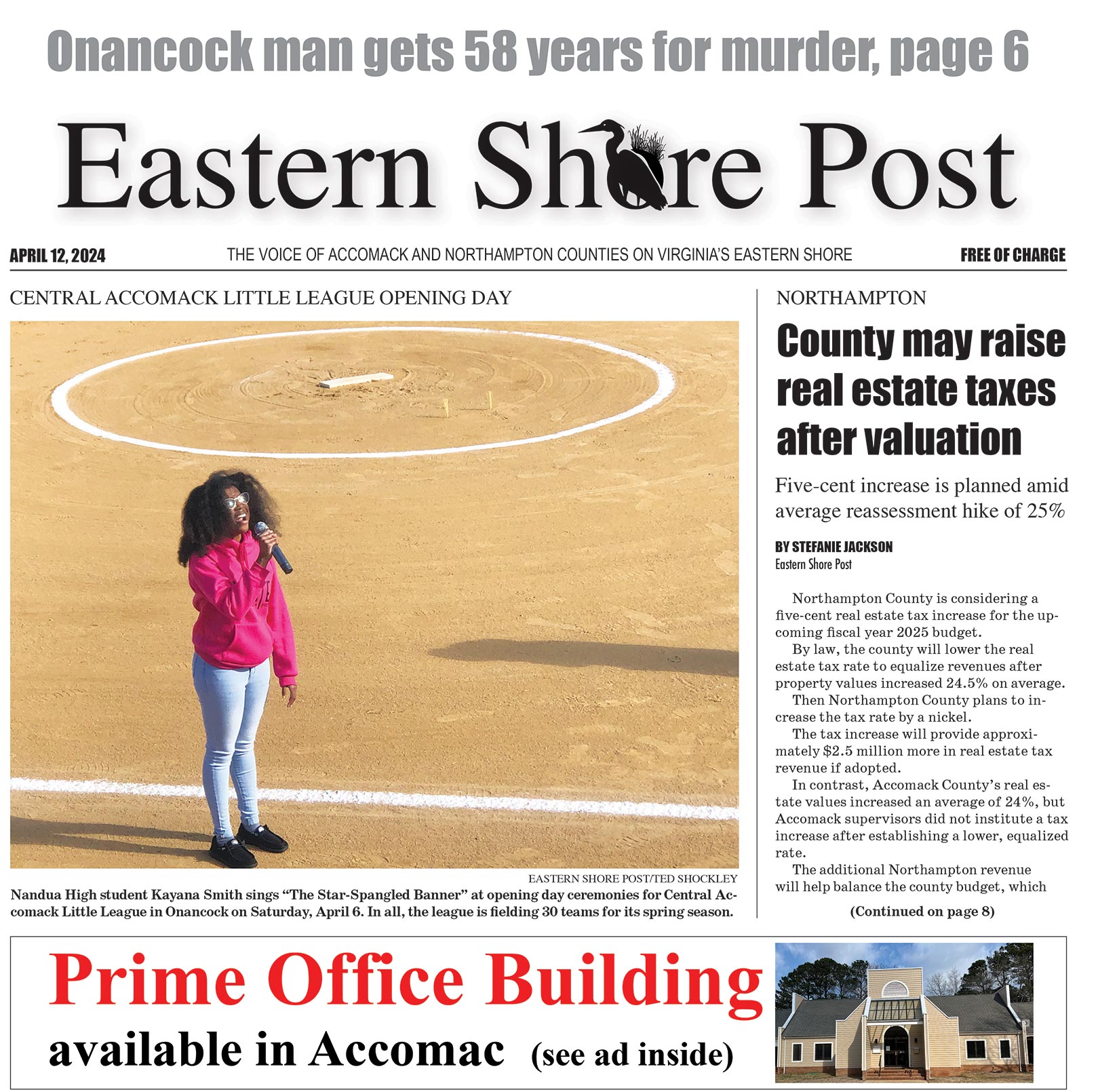By Stefanie Jackson – Exmore has the opportunity to join the Hampton Roads Sanitation District, get out of the sewer business, and remove the burden of billing and maintenance from town staff – but that may not be in the best interest of its citizens, the town council learned Monday night.
“HRSD is probably the best thing ever to happen to the Eastern Shore. It is not a good thing for Exmore,” said Town Manager Robert Duer.
The reason? No matter which option Exmore chooses to fix its sewer problems, it will cost millions of dollars, but choosing the HRSD option will sorely limit the funding sources available to the town.
HRSD is a political subdivision that was created by the Virginia General Assembly in 1940 to clean up pollution in Hampton Roads, and joining the sanitation district will eliminate Exmore’s chances of obtaining government funding for its sewer project – no grants, no low-interest loans.
Exmore would have to get a traditional loan from a bank, and with just under $3 million in cash, the town appears to be short on collateral to borrow the estimated $5 million needed to build out its sewer system according to HRSD specifications.
Exmore needs all the help it can get to fund infrastructure. About 73% of Exmore residents are ALICE (Asset Limited, Income Constrained, Employed), compared to 62% of Cheriton, 58% of Nassawadox, and 48% of Cape Charles.
There is another option – a public-private partnership in which the town, its citizens, and a private company would each take financial responsibility for a different part of Exmore’s sewer system.
The private company would build and run the sewage treatment plant, Exmore would build the sewer pipes that run to the plant, and each homeowner would purchase a grinder pump that processes sewage into a slurry and pumps it to the main sewer line.
Nassawadox is considering participating in the project. The wastewater treatment plant could be built in either Exmore or Nassawadox, with a pipeline running from one town to the other.
Duer estimated the public-private option could cost Exmore $6 million – a bit more than the HRSD option, but with the ability to obtain grants and low-interest loans to cover the cost.
Households also would be able to obtain grants and low-interest loans to cover the cost of the grinder pumps, which cost about $6,000 to $6,500 installed.
A resident who earns less than $12,500 annually – for example, a retired widow or widower living alone on a fixed income – could obtain a grant of up to $7,500 from the U.S. Department of Agriculture (USDA) to get a grinder pump for free.
All other residents would be eligible to obtain a USDA loan with 1% interest to buy a pump.
Every customer would be billed monthly for sewer service based on water usage as determined by a water meter. Each bill would include an additional charge to cover the town’s cost to construct the sewer pipe system.
Duer estimates the public-private option would cost each customer a monthly sewer service charge of $66.11 for 3,000 gallons of water used.
That’s less than the HRSD option, which could cost from $73.61 to $82.61 per month, depending on whether the Eastern Shore localities that join HRSD take on the debt associated with Onancock’s wastewater facility, where their sewage would be treated.
If Exmore joins the Hampton Roads Sanitation District, residents could see their monthly sewer bill increase significantly in 10 years, from the $80 range to $100 or even $150. How?
HRSD’s standard rate for every 1,000 gallons of wastewater collected and treated is $13.43. That number is expected to more than double by 2029 to $27.97.
By contrast, a public-private agreement would lock in wastewater treatment costs for 10 years.
“And after 10 years, they could double it, and we’d be in the same boat,” Councilman Chase Sturgis asserted.
But the private company that would partner with Exmore projects a rate increase of only about 2.5% over 30 years, Director of Utilities Taylor Dukes said.
“My goal with this project, when it gets done, is it works. … It’s not the cheapest built system, but it’s the cheapest for Exmore residents.
“It’s got to be affordable for our residents because if not, you’re going to run widows out of town, you’re going to run the widowers out of town.”
It’s not the low-income households receiving financial assistance that worry him.
“It doesn’t matter how high the bill goes. The more the bill goes up, the more assistance they get. They actually come out ahead,” Dukes said. The Accomack-Northampton Planning District Commission (A-NPDC) and other organizations have made those assurances, he added.
His main concern is for “blue-collar workers.”
He was also concerned about residents who make weekly payments on their monthly bills because they can’t afford to pay all at once. HRSD would not offer such flexible payment arrangements.
Sturgis asked what would happen if a homeowner’s pump failed after five years. Dukes said as he understands it, anyone with an income under the $12,500 threshold could apply for another USDA grant to replace the pump.
Duer was confident that if a homeowner takes care of the pump and doesn’t put objects like eggshells or sand down the drain, the pump will essentially “last forever.”
Dukes said improperly disposed items that he’s removed from septic systems have included diapers, clothes, and shoes.
The public-private option wouldn’t get Exmore completely out of the sewer business, but it would give the town control over sewer rates, and customers could speak directly to town staff or council members about any problems they have with the service.
Another benefit of the public-private option is time. A new sewer system could be up and running in two years, versus three to five years with the Hampton Roads Sanitation District.
“We don’t have five years,” Duer said.
Time is of the essence for growing businesses and organizations like Shore Christian Academy, which plans to construct a new school building in the near future.
Another motel or apartment building could be built in Exmore. A new restaurant could open. Affordable housing could be built for blue-collar workers like those in the seafood industry. Exmore could partner with the Northampton County School Board and provide affordable housing for teachers, too.
But infrastructure is needed for the town to grow.
“This is it in a nutshell,” Mayor Douglas Greer said. “The reason why we’re so interested in this is it’s time to move the town forward. It’s just that simple.”



